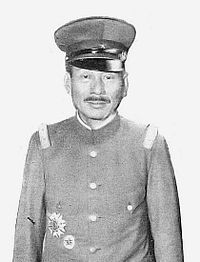Matsui Iwane
| Iwane Matsui | |
|---|---|
 |
|
| Born | July 27, 1878 Nagoya, Japan |
| Died | December 23, 1948 (aged 70) Tokyo, Japan |
| Allegiance | Empire of Japan |
| Service/branch | Imperial Japanese Army |
| Years of service | 1897–1938 |
| Rank | General |
| Commands held | |
| Battles/wars | |
| Awards | Order of the Golden Kite,Order of the Rising Sun |
| Spouse(s) | Fumiko Isobe (from 1912) |
| Other work | President of the Greater Asia Association |
Iwane Matsui (松井 石根 Matsui Iwane, July 27, 1878 – December 23, 1948) was a general in the Imperial Japanese Army and the commander of the expeditionary force sent to China in 1937. He was convicted of war crimes and executed by the Allies for his involvement in the Nanking Massacre.
Born in Nagoya, Matsui chose a military career and served in combat during the Russo-Japanese War (1904–05). He volunteered for an overseas assignment there shortly after graduating from the Army War College in 1906. As Matsui rose through the ranks, he earned a reputation as the Japanese Army's foremost expert on China, and he was an ardent advocate of pan-Asianism. He played a key role in founding the influential Greater Asia Association.
Matsui retired from active duty in 1935 but was called back into service in August 1937 at the start of the Second Sino-Japanese War to lead the Japanese forces engaged in the Battle of Shanghai. After winning the battle Matsui succeeded in convincing Japan's high command to advance on the Chinese capital city of Nanking. The troops under his command who captured Nanking on December 13 were responsible for the notorious Nanking Massacre.
Matsui finally retired from the army in 1938. Following Japan's defeat in World War II he was convicted of war crimes at the International Military Tribunal for the Far East (IMTFE) and executed by hanging. He and other convicted war criminals were enshrined at Yasukuni Shrine in 1978, an act that has stirred controversy.
Iwane Matsui was born in Nagoya on July 27, 1878. He was the sixth son of Takekuni Matsui, an impoverished samurai and former retainer to the daimyō of Owari during the Tokugawa shogunate. After completing elementary school, his parents insisted that he continue his education, but Matsui worried about his father's debts and did not want to burden him financially. Though he was a short, thin, and sickly young man, Matsui opted for a career in the Army, because in Japan at that time military schools charged the lowest tuition fees.
...
Wikipedia
